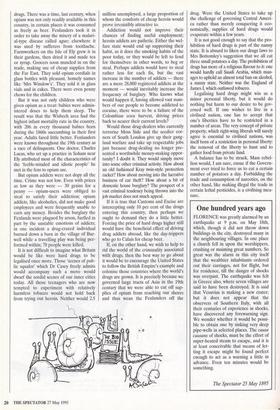DO WE REALLY WANT OPIUM DENS?
Ross Clark says that the new right-wing
campaign for legalisation of drugs is ignorant of historical precedent
A DECADE AGO, to call for the whole- sale legalisation of drugs was to be an aging hippie, to be one of the last rem- nants of the LSD generation not to have cut your hair and taken a job in the City. It meant also to be taken as being rather left- wing, occupying those further, more loony and irresponsible branches of the Labour Party, the sort of political agitator imbued with a hatred of any kind of authority. As for the rest of us, we all seemed to take the prohibition of drugs for granted; opin- ions varied only on the physical nature of the punishment which should be meted out to the peddlers.
How things have changed now we have a right wing desperate to come up with radi- cal ideas with which to spice the faltering legislative programme of a weary Conser- vative government. The legalisation of drugs, both hard and soft, has recently been demanded not only by retired judge James Pickles but also by Alan Duncan, Conservative MP for Rutland, Dr John Casey, fellow of Caius College, Cam- bridge, Paul Goodman of the Sunday Tele- graph, and not least by Dominic Lawson, editor of this magazine. One wonders how long it will be before Dr Clive Frogatt, convicted heroin-user, is invited back into the Tory fold as a hero.
Now that calling for the repeal of the Dangerous Drugs Acts has become main- stream it deserves to be challenged. Let us first set out the main arguments for aboli- tion. Our drugs laws operate like American alcohol prohibition: since hard drugs were made illegal in 1920 the fight to keep them out of the country has become hopeless. Customs and Excise intercept perhaps only one tenth of the drugs which enter Britain. However, the considerable risks involved in bringing them into the country ensure that supplies are kept relatively scarce. This in turn inflates prices, ensuring that most drug-users are unable to satisfy their addic- tion without resorting to theft, which is largely responsible for the inexorable rise in gangland warfare and domestic burglary in recent decades.
By this argument, legalising drugs will cause the bottom to fall out of the diugs market; drug addicts will no longer have to burgle our homes to satisfy their addiction, the crime rate will fall, albeit at the expense of a rise in squalor in public places and an increase in deaths among young, vulnerable adults. But what does this mat- ter anyway? ask the right-wing liberals. Surely adults are adults and do not need to be told what they can and cannot do by the nanny state?
Before you are tempted to become car- ried away by this argument, perhaps it would be as well to consider the precedent for allowing legal consumption of hard drugs. There was a time, last century, when opium was not only readily available in this country, in certain places it was consumed as freely as beer. Fenlanders took it in order to take away the misery of a malari- al-type disease called ague; elsewhere it was used by sufferers from toothache. Farmworkers on the Isle of Ely grew it in their gardens, then dried it and made tea or syrup. Grocers soon muscled in on the trade, making use of cheap supplies from the Far East. They sold opium cordials in glass bottles with pleasant, homely names like 'Mrs Winslow's'. They sold it in glass vials and in cakes. There were even penny chews for the children.
But it was not only children who were given opium as a treat: babies were admin- istered doses to help them sleep. The result was that the Wisbech area had the highest infant mortality rate in the country, with 206 in every thousand babies born during the 1860s succumbing in their first year. Adults fared little better. Fenlanders were known throughout the 19th century as a race of delinquents. One doctor, Charles Lucas, who set up a practice in Soham near Ely attributed most of the characteristics of the 'feeble-minded and idiotic people' he met in the fens to opium use.
But opium addicts were not dopy all the time. Crime was not low. Even with prices as low as they were — 30 grains for a penny — opium-users were obliged to steal to satisfy their addiction; opium addicts, like alcoholics, did not make good employees and were frequently unable to earn any money. Besides the burglary the Fenlands were plagued by arson, fuelled in part by the unstable emotions of addicts; in one incident a drug-crazed individual burned down a barn in the village of Bur- well while a travelling play was being per- formed within; 78 people were killed.
It is not difficult to imagine what Britain would be like were hard drugs to be legalised once more. Those 'scenes of pub- lic squalor' which Dr Casey freely admits would accompany such a move would dwarf the sordid scenes of our inner cities today. All those teenagers who are now tempted to experiment with relatively harmless tobacco would not hold back from trying out heroin. Neither would 2.5 million unemployed, a large proportion of whom the comforts of cheap heroin would prove irresistibly attractive to.
Addiction would not improve their chances of finding useful employment; heroin addicts are pathetic. Either the wel- fare state would end up supporting their habit, as it does the smoking habits of the poor today, or they would be left to fend for themselves: in other words, to beg or steal. Perhaps addicts would have to steal rather less for each fix, but the vast increase in the number of addicts — there are a mere 28,000 registered addicts at the moment — would inevitably increase the frequency of burglary. Who knows what would happen if, having allowed vast num- bers of our people to become addicted to cocaine, there were to be a failure of the Colombian coca harvest, driving prices back to nearer their current levels?
Would those drug-dealers who currently terrorise Moss Side and the seedier cor- ners of South London give up their gang- land warfare and take up respectable jobs just because drug-dealing no longer pre- sented a worthwhile money-making oppor- tunity? I doubt it. They would simply move into some other criminal activity. How about an old fashioned Kray twin-style protection racket? How about moving into the lucrative business of car theft? How about a bit of domestic house burglary? The prospect of a vast criminal tendency being thrown into the job market does not much appeal.
If it is true that Customs and Excise are intercepting only 10 per cent of the drugs entering this country, then perhaps we ought to demand they do a little better. Forcing the price of hard drugs higher still would have the beneficial effect of driving drug addicts abroad, like the day-trippers who go to Calais for cheap beer.
If, on the other hand, we wish to help to rid the world of the criminality associated with drugs, then the best way to go about it would be to encourage the United States to follow the British Empire's example and colonise those countries where the world's drugs are grown. It is precisely because we governed large tracts of Asia in the 19th century that we were able to cut off sup- plies of opium from reaching our shores and thus wean the Fenlanders off the drug. Were the United States to take up the challenge of governing Central Ameri- ca rather than merely conquering it eco- nomically, supplies of hard drugs would evaporate within a few years.
It is not good enough to say that the pro- hibition of hard drugs is part of the nanny state. It is absurd to liken our drugs laws to Mrs Bottomley's suggestion that we all eat three small potatoes a day. The prohibition of drugs has more of a religious flavour to it: one would hardly call Saudi Arabia, which man- ages to uphold an almost total ban on alcohol, a nanny state. Neither was the England of James I, which outlawed tobacco.
Legalising hard drugs might win us a minor personal liberty, but it would do nothing but harm to our desire to be gov- erned well. If one wishes to live in a civilised nation, one has to accept that one's liberties have to be restricted in a number of areas. The very concept of private property, which right-wing liberals will surely agree is essential to civilised nations, was itself born of a restriction in personal liberty: the removal of the liberty to hunt and to gather food from private land.
A balance has to be struck. Mass rebel- lion would, I am sure, ensue if the Govern- ment ever tried to force us to eat a certain number of potatoes a day. Forbidding the trade and consumption of narcotics, on the other hand, like making illegal the trade in certain lethal pesticides, is a civilising mea- sure.



































































 Previous page
Previous page